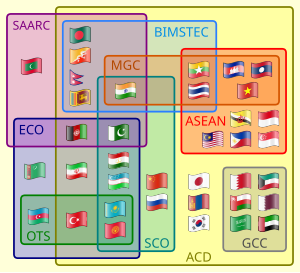Turkey's membership of international organizations



Turkey is a founding member of the United Nations,[1] the Organisation of the Islamic Conference (now the Organisation of Islamic Cooperation),[2] the Organisation for Economic Co-operation and Development[3] and the Organization for Security and Co-operation in Europe,[4] has been in the Council of Europe since 1949,[5] and in NATO since 1952.[6] Since 2005, Turkey is in accession negotiations with the European Union, having been an associate member since 1963 and is also in European Customs Union.[7] Turkey is also a member of the G20 industrial nations which brings together the 20 largest economies of the world.
Turkey entered NATO in 1952 and serves as the organization's vital eastern anchor, controlling the straits leading from the Black Sea to the Mediterranean and sharing a border with Syria, Iraq, and Iran. A NATO headquarters is located in İzmir, and the United States has maintained air forces at a Turkish base called Incirlik that is located near the Mediterranean city of Adana.
Turkey is also member of the World Trade Organization (WTO). It has signed free trade agreements with the European Free Trade Association (EFTA), Israel, the United Kingdom[8] and many other countries. In 1992, Turkey and 10 other regional nations formed the Black Sea Economic Cooperation Business Council to expand regional trade and economic cooperation.
In December 2000 Turkey became an observer state of the Association of Caribbean States (ACS).[9] In 2017 ASEAN-Turkey Sectoral Dialogue Partnership was recognized by the 50th ASEAN Foreign Ministers' Meeting in Manila, Philippines.[10]
List of international organizations
[edit]
|
|
See also
[edit]- Foreign relations of Turkey
- Free-trade agreements of Turkey
- Turkey–United States relations
- Turkey–United Kingdom relations
- Turkey–European Union relations
- Turkey in NATO
- Russia–Turkey relations
- Ministry of Foreign Affairs of Turkey
- List of Turkish diplomats
- Turkish diplomatic missions
- Politics of Turkey
- Republic of Turkey
- Ottoman Empire
- List of European countries by membership in international organisations
- Membership of Northern Cyprus in international organizations
Notes
[edit]- ^ see also Ankara Agreement
References
[edit]- ^ United Nations (2006-07-03). "Growth in United Nations membership (1945-2005)". United Nations. Retrieved 2006-10-30.
- ^ Organisation of the Islamic Conference (2006). "OIC Membership". OIC. Archived from the original on 2001-02-21. Retrieved 2006-10-30.
- ^ OECD (2006). "OECD membership". OECD. Retrieved 2006-10-30.
- ^ Organization for Security and Co-operation in Europe (2005). "OSCE Participating states". OSCE. Retrieved 2006-10-30.
- ^ Council of Europe (2006-10-27). "Turkey and the Council of Europe". Council of Europe. Archived from the original on 2006-12-07. Retrieved 2006-10-30.
- ^ NATO. "Greece and Turkey accede to the North Atlantic Treaty Organization". NATO. Retrieved 2006-10-30.
- ^ Turkish Secretariat of European Union Affairs. "Chronology of Turkey-EU relations". Turkish Secretariat of European Union Affairs. Archived from the original on 2007-02-24. Retrieved 2006-10-30.
- ^ "UK-Turkey Free Trade Agreement". Retrieved 8 November 2021.
- ^ Turkey donates to ACS Archived 2007-08-13 at the Wayback Machine, 21.06.2002
- ^ "Turkey's Relations with the Association of Southeast Asian Nations (ASEAN) / Rep. of Turkey Ministry of Foreign Affairs". www.mfa.gov.tr. Archived from the original on 2012-03-09.
Further reading
[edit]- Contessi, Nicola P. "Turkey and the Shanghai Cooperation Organization: Common values, economics or pure geopolitics?" in Emre Erşen, Seçkin Köstem, eds. Turkey's Pivot to Eurasia. Geopolitics and Foreign Policy in a Changing World Order, Routledge, 2019, pp. 93–110.
